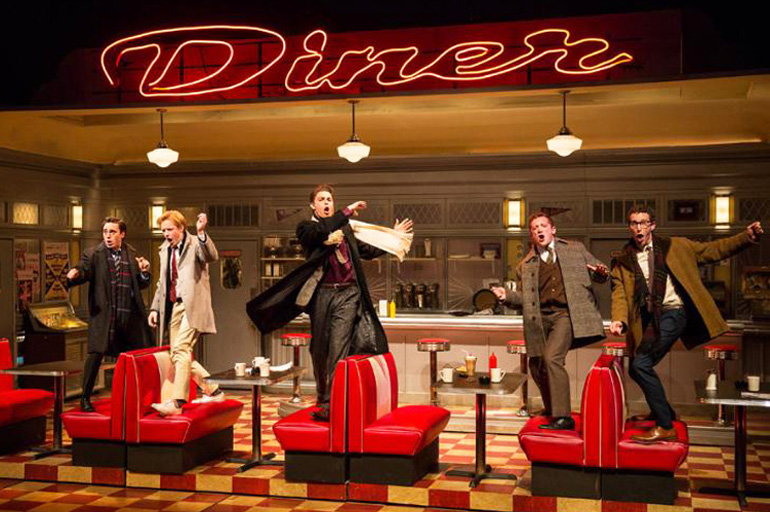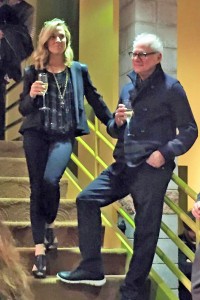
Diner, the Musical. By Barry Levinson. Music and lyrics by Sheryl Crow. Directed by Kathleen Marshall. Delaware Theatre Company.
Barry Levinson’s movie Diner was released in 1982, seven years before Jerry Seinfeld and Larry David came up with the idea for a show about “nothing” — that is, everyday activities of friends who hang out in a Manhattan diner.
The cult-favorite film and the TV series have much in common, and we must keep in mind that Levinson’s creation came first. One big difference is that Diner was set specifically in 1959 (and in a Baltimore diner instead of New York.) When writing the book for this new musical, Levinson kept that time period and so did the songwriter Sheryl Crow.
The great appeal of the film is its low-key exploration of the interchanges among a close group of friends at a vulnerable time in their lives. This adaptation for the stage maintains much of that intimacy.
The score is a major achievement for Crow who, after all, was not born until 1962. (She became one of the most popular singer-songwriters in the 1980s and 90s.) Crow has captured the sounds of the late 1950s — not just a stereotypical view of it, as the creators did with Hairspray, but a mix of pop, rock‘n’roll, doo wop, Motown, and even Latin-infused ballads that radio stations played then. I know; I was a disc-jockey at that time. For one summer I also was the record librarian at WIP in Philadelphia and picked the records that other deejays played.
Levinson says he would not have gone back and turned his movie into a stage work, except for one thing. He realized that the film was entirely from the male point of view. The protagonists expected all women to stay home and have babies, and the movie didn’t let us hear their dreams and frustrations. His script for this show positively adds that dimension.
One of the women rejects her boyfriend and moves to Chicago when she gets a chance to be the first female assistant producer for a TV station there. She sings: “Who knows what a woman can be?” The other women lack such a dramatic change, but they do reveal strong feelings about their expected role in society.
The hallmark of Diner is that it does not depend on big events but concentrates on the incremental everyday activities of young people in that era. For example, considerable angst surrounds a football trivia contest to which one of the guys subjects his fiancee. If she can’t match his encyclopedic knowledge of the sport, he’s ready to break off their wedding plans.
The musical retains another trivial element that I remember fondly from the movie: One young man names 45 rpm records and his pals have to remember what was on the flip side, as well as the color of the label. In other words, this show retains what was good in the film and adds context, as well as adding more than a dozen excellent songs.
Levinson’s script includes a melancholy framing narration which informs us about what happened to these youngsters later in their lives.
All of the men are fine: John E. Brady, Ari Brand, Matt Dengler, Aaron C. Finley, Josh Franklin, Derek Klena, John Leone, Jonathan Shew, Ethan Slater, and Steve Steiner. Erika Henningsen, Brynn O’Malley and Tess Soltau are especially strong female participants. Director Kathleen Marshall keeps things moving and adds appropriate choreography that does not overwhelm the intimate story.
I hate to nit-pick but there’s just one thing that’s not true to the period. Immediately after the young woman starts her great job in Chicago she delivers a baby out of wedlock. In reality, it’s more likely that she’d have an abortion, even though that was illegal. That’s what people did then.
